what is good to add to soil for texas mountain laurel tree

Dermatophyllum secundiflorum
The intoxicating fragrance of Texas mount laurel is enough to cause drivers to slam on the brakes or dog walkers to abruptly end short, giving poor Fido whiplash.
Famed Boob tube chef Emeril Lagasse used to lament the not-invention of "odor-o-vision." I wish for "smell-o-website" so I could share with y'all the heavenly scent produced by the pretty purple flowers of these shrubs.
Even better, this is one of those plants that disperses its aroma several feet; I can aroma my neighbors' constitute's blooms from across the street.

We link to vendors to aid yous find relevant products. If you buy from i of our links, we may earn a committee .
Some compare the aroma to grape Kool-Aid, soda, or gum, but the fragrance is deeper, richer, and more floral than the artificial smell of processed food.
Read on to learn more!
What You'll Learn
- What Is Texas Mountain Laurel?
- Cultivation and History
- Propagation
- How to Abound
- Growing Tips
- Pruning
- Where to Purchase
- Managing Pests and Affliction
- All-time Uses
- Quick Reference Growing Guide
What Is Texas Mountain Laurel?
Texas mountain laurel'southward sleeky, dark green leaves are evergreen and leathery. The big clusters – as long equally vi inches – of showy flowers appear in early on spring, and sadly, flower for just a few weeks before withering and taking their scent away.
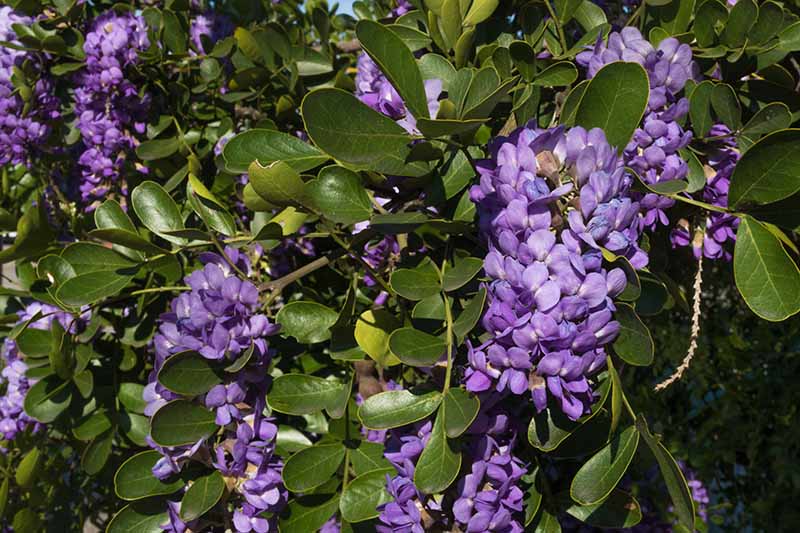
Though these slow-growing plants can be kept pruned to a shrub size, almost ofttimes they are allowed to mature into small treelike forms ten feet broad and 15 anxiety loftier, multi- or single-trunked.
Older specimens in their natural habitat can reach xxx to l feet tall at maturity.
But the breathtaking bouquet is just one of the charms of this Texas native, which is hardy to USDA Hardiness Zone 7b.
This constitute has several mutual-name aliases, including coral bean, hot edible bean, mescal bean, mescal edible bean sophora, frigolito, frijollito, frijolillo, coral bean, big-drunk bean, and colorin.
Some of these are cogitating of the institute'due south native territory, which in addition to central, southern, and western Texas, likewise includes New Mexico and northern Mexico.
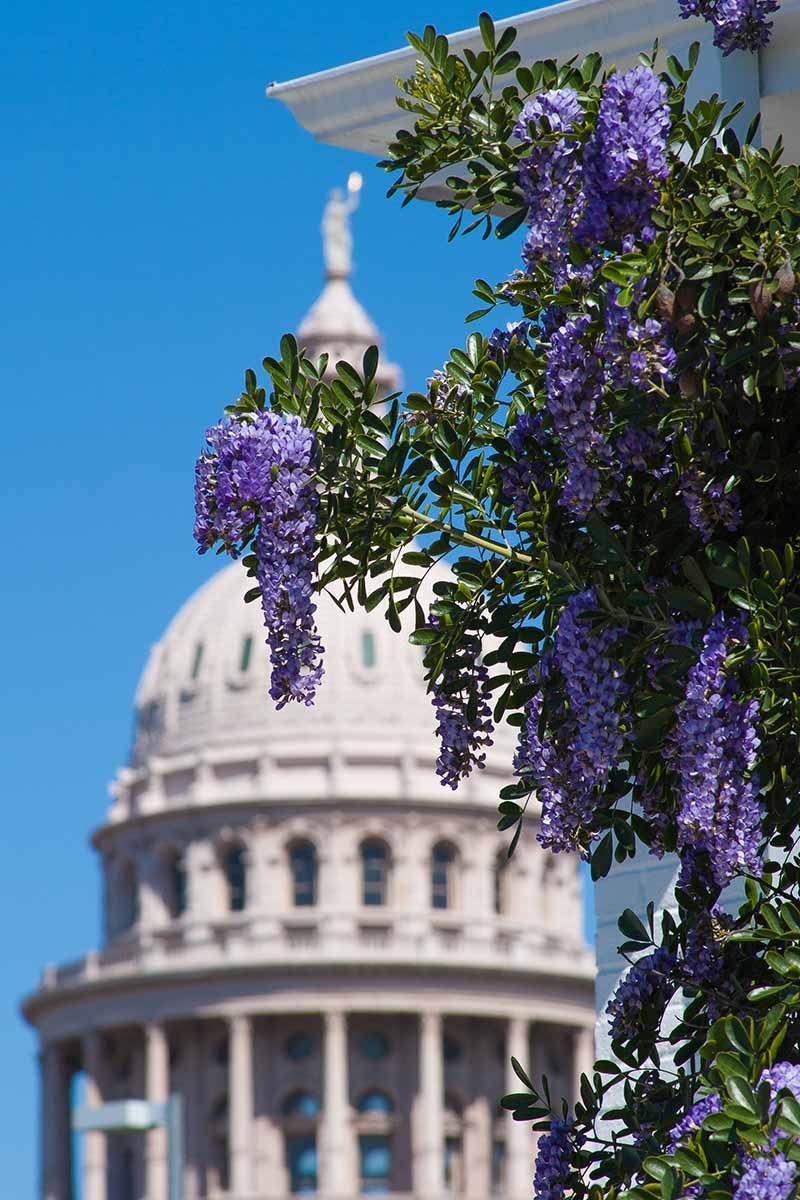
But, Texas being Texas, we had to stamp it with our own proper noun, of course.
Previously known interchangeably equally Sophora secundiflora and Calia secundiflora, contempo phylogenetic studies accept led to the reclassification of certain members of the Sophora genus into Dermatophyllum – a taxonomic synonym for Calia.
Y'all will still see Texas mountain laurel referred to as Due south. secundiflora or C. secundiflora in some places.
Lovely as they are, the flowers of Texas mountain laurel are toxic to humans and animals, as are the plant's seed pods and leaves. The seeds – called mescal beans – are a pretty orangish-red color and are sometimes used as necklace beads.
Cultivation and History
A quick note: those of us here in Texas understand there's some other institute that calls itself "mountain laurel." Nevertheless, our laurel is unrelated to Kalmia latifolia , a member of the heather family, Ericaceae, whereas ours is in the pea family unit, Fabaceae.
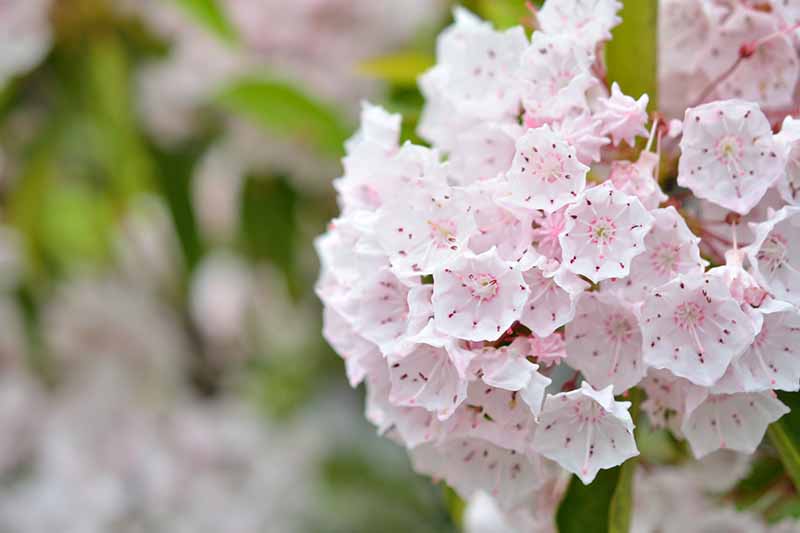
Toxic mescal beans were used ritually by indigenous peoples of the Fundamental and Southern plains tribes for their psychoactive properties. Evidence of their employ tin be found in numerous archaeological sites in Texas and Mexico, and shows that these cultures also used the colorful seeds decoratively.
The mescal beans incorporate a number of poisonous quinolizidine alkaloids, including cystine, a narcotic alkaloid with a similar molecular structure to that of nicotine.
However, in spite of the name, they practise non contain the hallucinogenic alkaloid mescaline, establish in the peyote cactus. Nor should they exist dislocated with the alcoholic beverage mezcal, which is made from the agave plant.
Propagation
These plants abound slowly, so if y'all're looking for an immediate argument in the landscape, y'all might consider purchasing a well-established specimen in a large container from a local nursery.
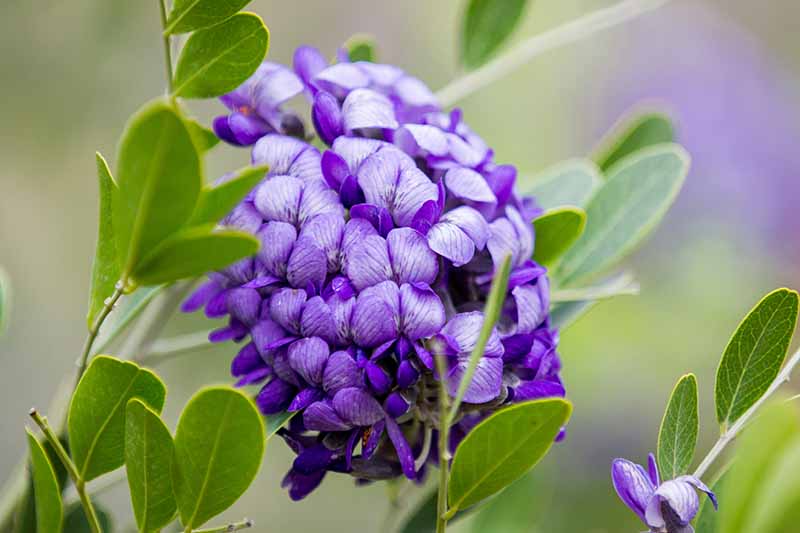
Texas mountain laurel does not propagate well from cuttings.
Yet, if you're patient, you lot tin grow a Texas mount laurel from seed.
From Seed
Seeds that autumn from the plant tin can take years to germinate, every bit they take extremely hard shells. Merely a few tricks may provide faster results, if you'd like to grow some seedlings for transplant into the garden.
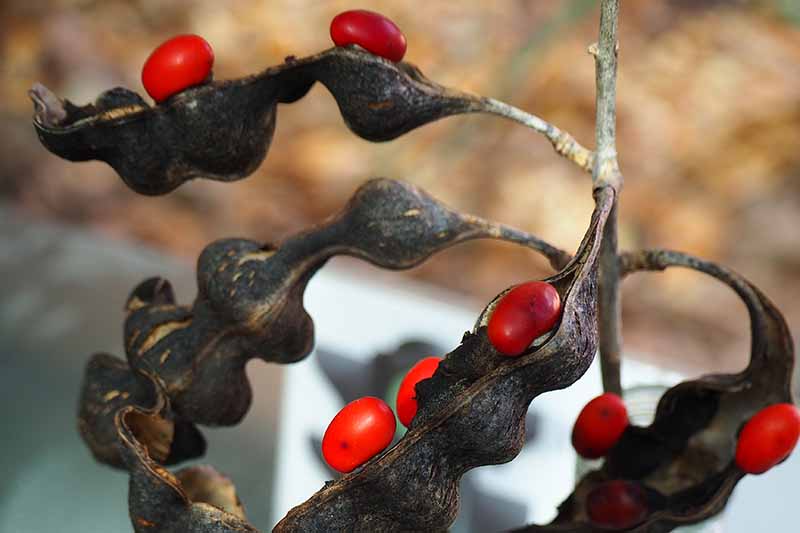
If you're collecting seeds, selection the pods when they're yet mostly green but just starting to plow gray. The seeds volition exist pale pink and their shells will exist relatively soft.
Sow these in gallon-sized containers with holes in the bottom filled with well-draining potting mix. Water often.
Alternatively, you lot tin can direct sow in the garden. Bury the seed about half an inch deep.
And be patient.
If someone hands yous some hard, older pods, soak them in h2o to go far easier to break them apart and get at the seeds. With both donated and purchased seeds, chances are they're more mature. You'll have to scarify them earlier planting, every bit they have extremely hard shells.
As you would with forenoon glories, scratch them up with a knife, for case, or utilise sandpaper.
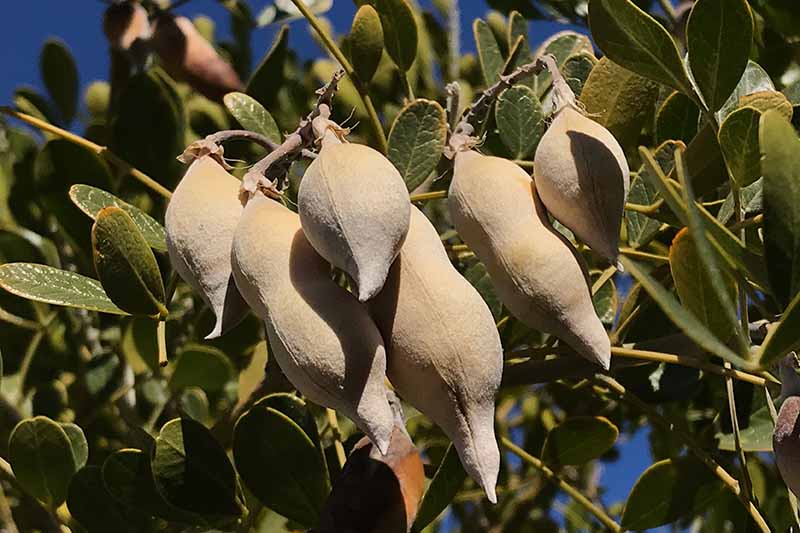
You tin endeavor soaking the seeds in warm water for 2 to iii days, changing the water regularly to continue it tepid. This approach appears to work best if you first brand a small cutting in the tough outer beat out.
However you lot plant your seeds, h2o them daily for the first couple of months, so most once a week for another year.
From Seedlings or Transplants
When transplanting into the footing, mix some extra calcium into the soil at the planting site to aid plants become established.
Dig a pigsty slightly bigger than the root ball, then carefully place the root brawl into the hole, and backfill with planting site soil.
Mature Texas mountain honour accept a deep root organisation, and they do not transplant well in one case established.
How to Grow
Texas mountain laurel prefers element of group i, well-drained rocky soils, including those that incorporate limestone. They'll do well in clay, loam, and sand, and will tolerate beingness planted in or most turf.
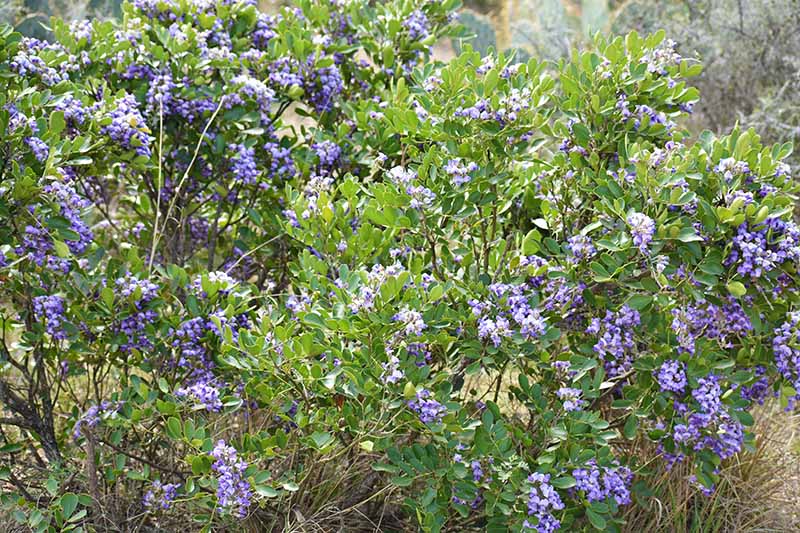
Choose a planting site in an area that gets total sun. D. secundiflorum will as well tolerate lite shade for function of the twenty-four hour period.
Once established, these drought-tolerant shrubs require little to no irrigation.
They besides practise perfectly well with no fertilization, merely in areas with very poor soil yous can add a small amount of a balanced fertilizer such as NPK 10-10-10 in springtime.
Growing Tips
- Plant in a sunny spot
- Soil should be alkaline and well-draining
- Water regularly for the starting time year
Pruning
In that location is no actual need to prune Texas mountain laurel. Merely if you want to alter its form, say, into more of a traditional tree shape, or into a more compact bush, you tin do and then.
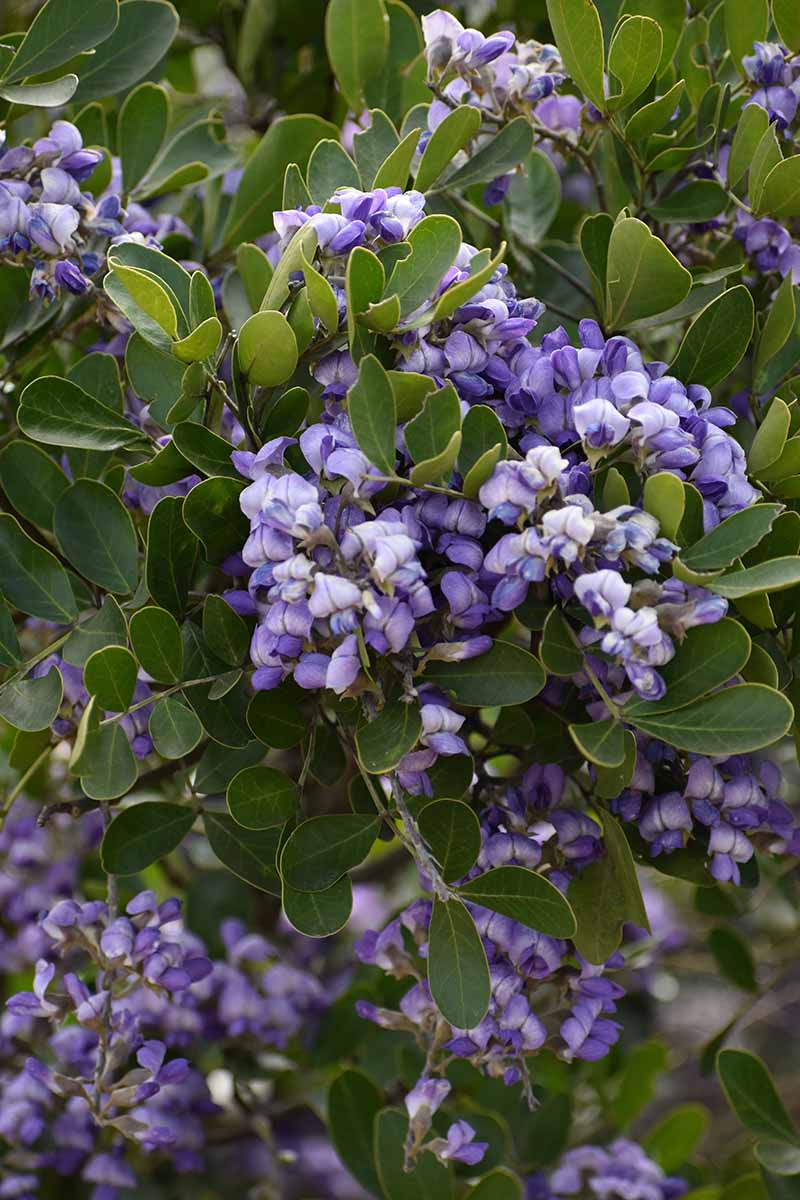
Go on in heed that the blossoms only appear on twelvemonth-quondam wood. And so while you might be tempted to clip during winter dormancy, this might result in less abundant blooms.
An alternative pruning time is in the summer, after it has finished flowering. When the brutal heat strikes, like many of us, these plants volition become fallow.
Prune no more than one-third of the plant at a fourth dimension. First prune out any deadwood. Then cutting out thin, spindly branches. At that place's no need to use pruning paint.
To encourage peak, prune out lower branches and exit just ane, 2, or three trunks. For a more shrub-like appearance, trim the upper branches.
Where to Buy
If you're looking for live plants, you tin can oftentimes observe them in garden centers and plant nurseries in areas where they typically thrive. Buying seeds online can be a scrap hit or miss, equally they may non always be viable.
Managing Pests and Affliction
Let's first with the good news. Deer leave this one alone, so zip to worry nearly there.
The bad news is that this plant is plagued by Uresiphita reversalis, aka genista caterpillar or sephora worm.
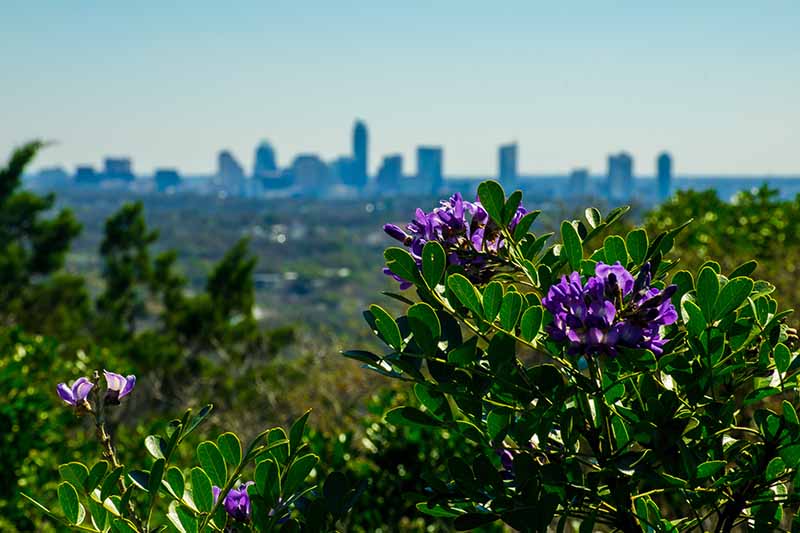
This yellow-bodied immature moth can strip the leaves off a Texas mountain laurel in no time flat, though the foliage almost always grows back and the plant suffers no permanent harm.
The caterpillars form loose webbing on the plants they're decimating.
Control these one-inch-long snackers with Bacillus thuringiensis .
Best Uses
Texas mountain laurel makes a lovely specimen tree or shrub, which is primarily how I see them grown in Austin.

You tin can as well create a tall screen with these, by planting several in a row and letting them bush out.
Quick Reference Growing Guide
| Establish Type: | Shrub | Flower / Foliage Color: | Majestic; dark dark-green |
| Native to: | Texas, New Mexico, United mexican states | Maintenance: | Depression |
| Hardiness (USDA Zone): | 7b-xi | Tolerance: | Rocky soil, drought |
| Bloom Time / Season: | Belatedly wintertime, early jump | Soil Blazon: | Poor to average |
| Exposure: | Full sun to fractional shade | Soil pH: | Higher up seven.2 (alkaline) |
| Spacing: | 10 feet | Soil Drainage: | Well-draining |
| Planting Depth: | Seeds: i/2 inch; transplant: aforementioned depth as root ball | Water Needs: | Minimal |
| Tiptop: | 15 feet | Uses: | Specimin or screen |
| Spread: | 10 feet | Family: | Fabaceae |
| Growth Rate: | Ho-hum | Genus: | Dermatophyllum |
| Attracts: | Collywobbles, bees | Species: | secundiflorum |
| Common Pests: | Genista caterpillar (also known as sephora worm) | Common Disease: | Root and crown rot |
Source: https://gardenerspath.com/plants/ornamentals/grow-texas-mountain-laurel/#:~:text=Texas%20mountain%20laurel%20prefers%20alkaline,area%20that%20gets%20full%20sun.
0 Response to "what is good to add to soil for texas mountain laurel tree"
Post a Comment